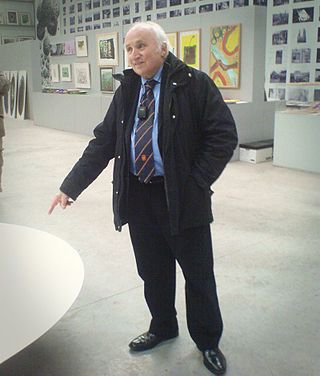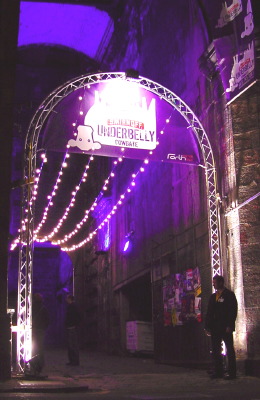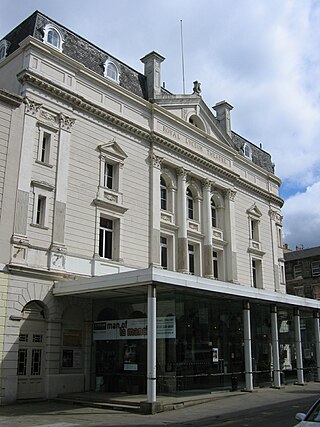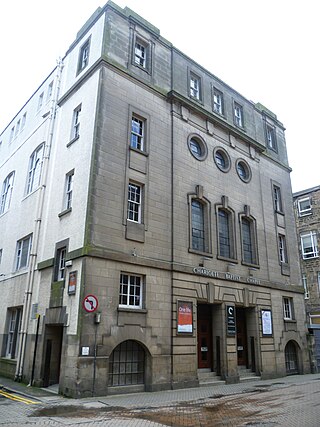
The Edinburgh Festival Fringe is the world's largest performance arts festival, which in 2019 spanned 25 days and featured more than 59,600 performances of 3,841 different shows in 322 venues. Established in 1947 as an alternative to the Edinburgh International Festival, it takes place in Edinburgh every August. The Edinburgh Festival Fringe has become a world-leading celebration of arts and culture, surpassed only by the Olympics and the World Cup in terms of global ticketed events. As an event it "has done more to place Edinburgh in the forefront of world cities than anything else" according to historian and former chairman of the board, Michael Dale.

Scottish Opera is the national opera company of Scotland, and one of the five national performing arts companies of Scotland. Founded in 1962 and based in Glasgow, it is the largest performing arts organisation in Scotland.

Fringe theatre is theatre that is produced outside of the main theatre institutions, and that is often small-scale and non-traditional in style or subject matter. The term comes from the Edinburgh Festival Fringe. In London, the fringe are small-scale theatres, many of them located above pubs, and the equivalent to New York's Off-Off-Broadway theatres and Europe's "free theatre" groups.

The Edinburgh International Festival is an annual arts festival in Edinburgh, Scotland, spread over the final three weeks in August. Notable figures from the international world of music and the performing arts are invited to join the festival. Visual art exhibitions, talks and workshops are also hosted.

Richard Demarco CBE is a Scottish artist and promoter of the visual and performing arts.

Gilded Balloon is a producer and promoter of live entertainment events, based in Edinburgh, Scotland, and best known as one of the Big Four venue operators at the Edinburgh Festival Fringe each August.

James Almand Haynes was an American-born figure in the British 1950s-60s counterculture, beginning in Edinburgh, Scotland with the opening of The Paperback bookshop in 1959. He was also a co-founder of Edinburgh's Traverse Theatre, The Howff, and a co-producer of the 1962 Edinburgh Writers and 1964 Drama conferences. In London, he co-founded the underground newspaper International Times and the London Drury Lane Arts Lab. In 1969 he relocated to Paris and taught at the University of Paris, and for over 30 years hosted his open door Sunday Dinners, to international gatherings.

The National Theatre of Scotland, established in 2006, is the national theatre company of Scotland. The company has no theatre building of its own; instead it tours work to theatres, village halls, schools and site-specific locations, both at home and internationally.

The Underbelly is a venue at the Edinburgh Festival Fringe off Cowgate. From 2001 to 2004, Underbelly was the only venue operated by Underbelly Limited. In 2005, Underbelly added the Baby Belly venue. In 2006, these venues were joined by the E4 UdderBELLY and the Cow Barn.
John Mackenzie Calder was a Scottish-Canadian writer and publisher who founded the company Calder Publishing in 1949.

The Royal Lyceum Theatre is a 658-seat theatre in the city of Edinburgh, Scotland, named after the Theatre Royal Lyceum and English Opera House, the residence at the time of legendary Shakespearean actor Henry Irving. It was built in 1883 by architect C. J. Phipps at a cost of £17,000 on behalf of James B. Howard and Fred. W. P. Wyndham, two theatrical managers and performers whose partnership became the renowned Howard & Wyndham Ltd created in 1895 by Michael Simons of Glasgow.
Vanishing Point theatre company was founded in Glasgow in 1999 by Matthew Lenton.
Norbert Francis Attard is a Maltese multi-disciplinary artist, art collector, gallerist and entrepreneur known for his varied approaches to artistic projects, multi-media works, installations and anthropological-based projects.
Daniel Craig Jackson, also known as D.C. Jackson, is a Scottish playwright, born in 1980.
Jules Horne is a Scottish playwright, radio dramatist and fiction writer.
Zinnie Harris FRSE is a British playwright, screenwriter and director currently living in Edinburgh. She has been commissioned and produced by the Royal Court Theatre, Royal National Theatre, the National Theatre of Scotland and the Royal Shakespeare Company. Her plays have been translated and performed in many countries across Europe and the globe.

Our Ladies of Perpetual Succour is a play based on the 1998 novel The Sopranos by Alan Warner, adapted for the stage by Lee Hall. It received its world premiere at the Traverse Theatre, Edinburgh, in August 2015, before embarking on a short UK tour. The play is a co-production between the National Theatre of Scotland and Live Theatre. The production ran at London's National Theatre in August 2016 and was scheduled to transfer to the West End's Duke of York's Theatre in May 2017.
Assembly is a theatre and comedy promotion company, producer and venue operator. It programmes and promotes entertainment events at venues in Edinburgh, London and Brighton, and is the longest-established of the so-called Big Four promoters at the Edinburgh Festival Fringe in August. Year-round audience numbers at Assembly events are more than 500,000, and the company's artistic director is William Burdett-Coutts.
The Gateway Theatre was a Category C listed building in Edinburgh, Scotland, situated on Elm Row at the top of Leith Walk.

The Rose Theatre is an arts venue and Category B listed building on Rose Street, Edinburgh, Scotland, owned by ballet dancer and Olivier Award winning director Peter Schaufuss and is as a year round venue for theatre, comedy, music, dance and cabaret. It is also the home of the Rose Theatre Cafe. The venue is playing a major role during the Edinburgh Festival Fringe.















